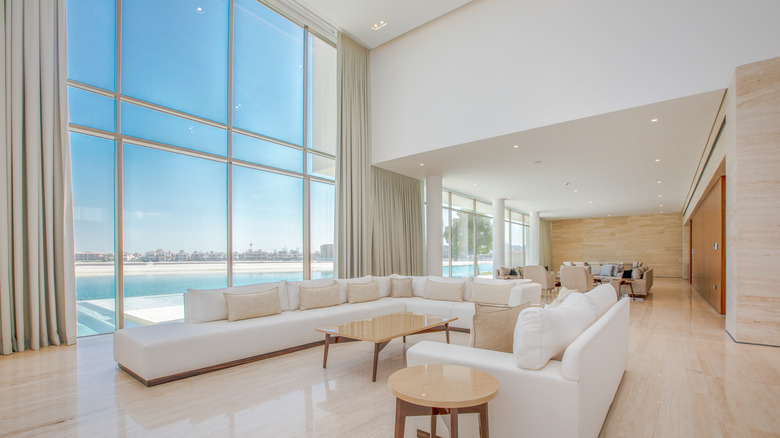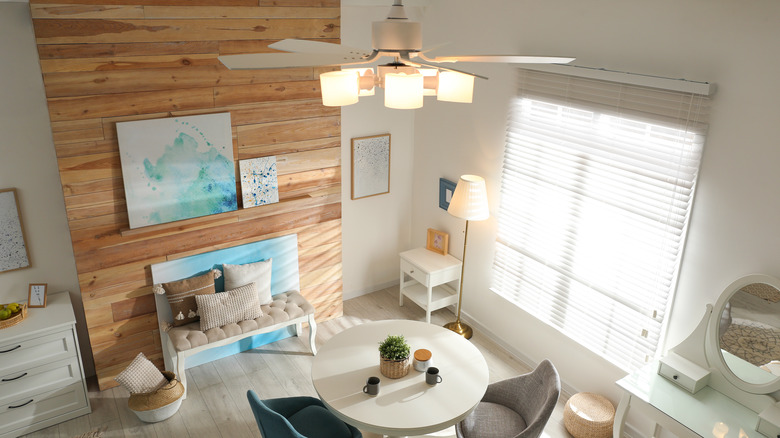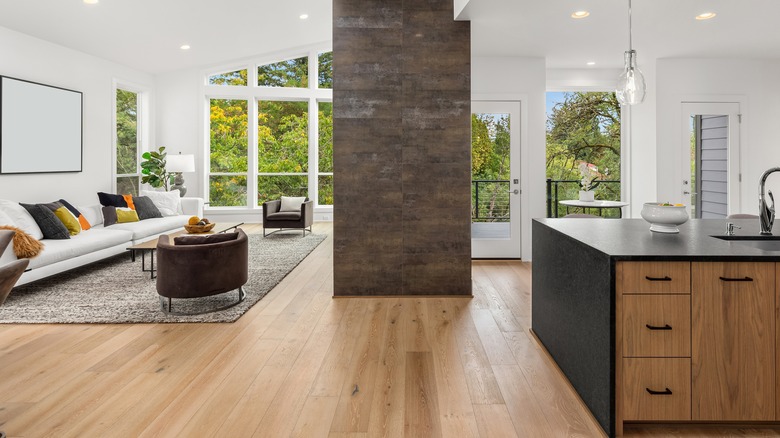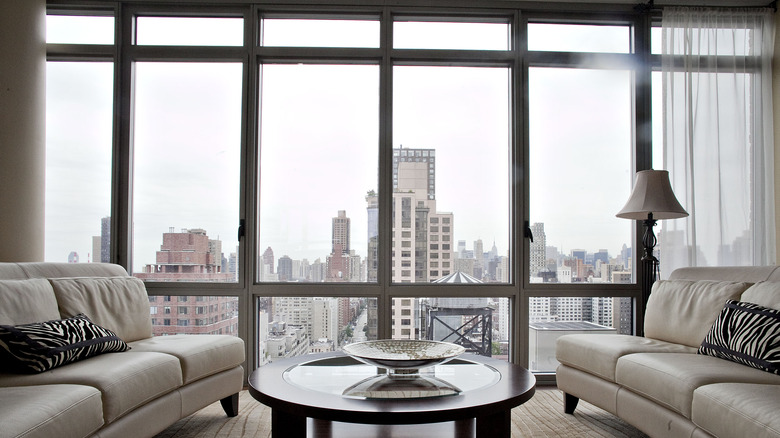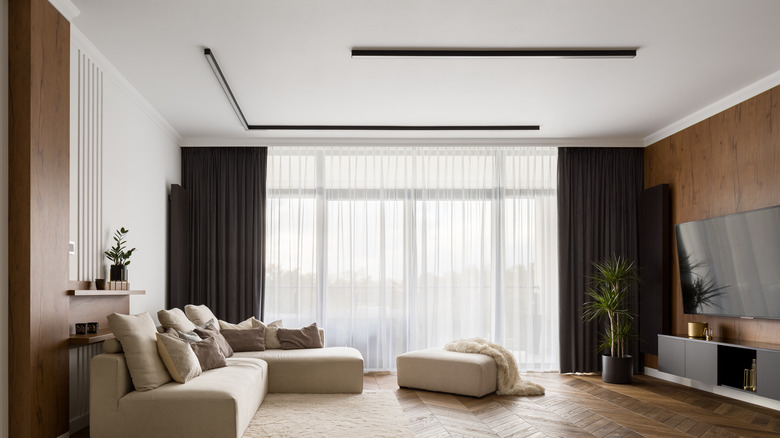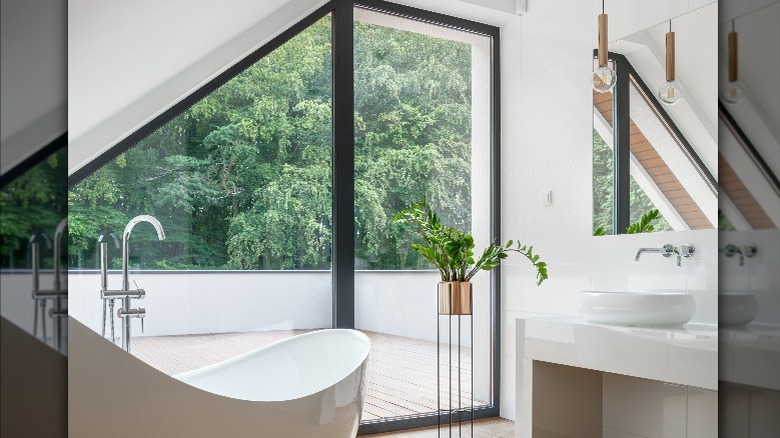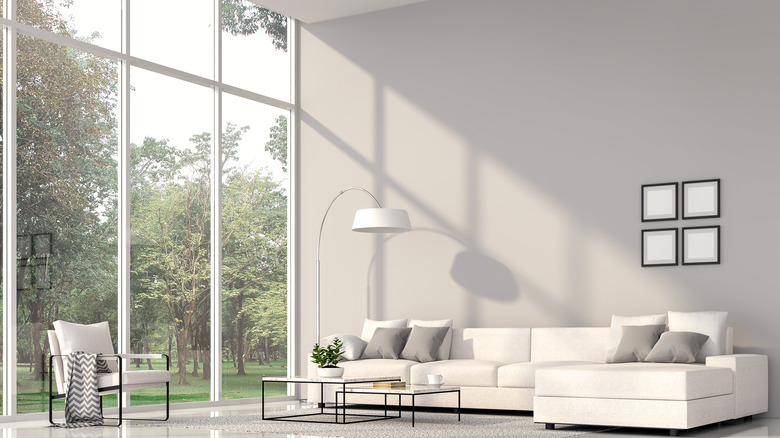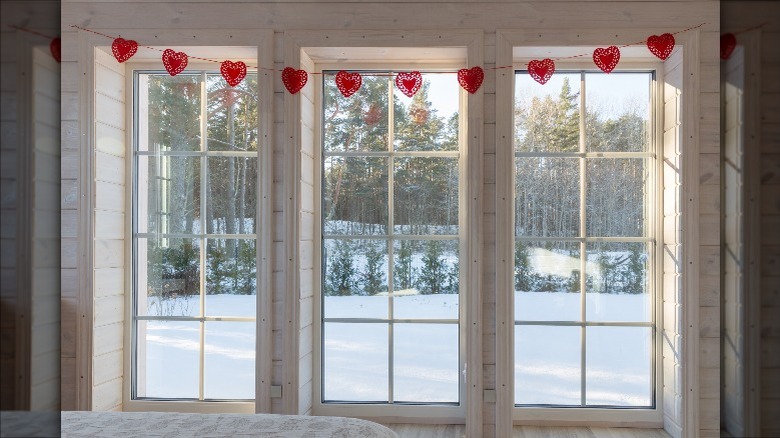10 Reasons Why You Might Regret Those Floor-To-Ceiling Windows
From a design standpoint, there are no cons to planning a living or working space with floor-to-ceiling windows. Having picture windows that can double as glass walls theoretically makes it easy to design an interior, since big windows immediately add a sense of lift and space. And, it lets in plenty of natural light, which in turn can improve the mood and health of its occupants, according to Riel.
When floor-to-ceiling windows are added to a home in the mountains, near the sea, or even in a condo overlooking a vibrant urban environment, designers like Rick Alexander say the windows act as a conduit which connects the occupants with the outside world, allowing them to "expand living onto outdoor spaces," per The Plan Collection.
But as with all things there is a price to pay when you decide to go with floor-to-ceiling windows. Often, that price is financial — after all installing a huge pane of treated glass that could well be two or three times your height won't be cheap. But there are other non-material costs involved too — and these could be hefty enough to make you think twice about opting for floor-to-ceiling window, no matter how aesthetically pleasing they might be.
1. Installing floor-to-ceiling windows isn't cheap
If you don't live in a home that already comes with floor-to-ceiling windows, making the switch may not be as inexpensive as you might think because the glass needs to be insulated, laminated, or tempered, shares Glass Genius. As such, you can expect to spend between $700 to $1,600 per square foot, and that price is likely to go up if you are looking to use a type of glass that is custom-made.
2. Floor-to-ceiling windows are difficult to clean
If you have floor-to-ceiling windows, you know you're lucky to have glass walls that can invite the outdoors in — be it a view of a peaceful garden or a busy urban cityscape. But that view comes with a price, because as Baxclean points out, oversized windows aren't exactly easy to clean.
If you live on ground level, cleaning your glass will require a ladder tall enough to reach the top, and some anti-slip tape to try and prevent accidents. Otherwise, it may be best to leave cleaning to the pros.
3. Certain floor-to-ceiling windows block natural ventilation
Unless they are specially built so they can open, floor-to-ceiling windows are usually fixed or "non-operable," per Pella; this means they aren't able to open up and give the indoors any access to fresh air. This also means that while you'll get the views you've probably always dreamed of, you'll need to resort to other means to improve your home's air quality. This includes making use of fans, air filters, or air conditioning, per the Centers for Disease Control.
4. Floor-to-ceiling windows aren't energy efficient
Floor-to-ceiling windows may be great about letting the outside in, but they aren't particularly efficient when it comes to keeping winter cold and summer heat out. Home Edit notes that they can let in abundant sunshine that can warm a room up, in turn warranting use of an air conditioner or fan — especially in the hot months. Then when the weather is chilly, floor-to-ceiling windows can allow cool air inside much more so than regular walls would.
5. Floor-to-ceiling windows let in too much light
One of the big pluses about having floor-to-ceiling windows is having plenty of natural light, which cuts the need for lamps and other artificial light fixtures. Unfortunately there can be a thing as too much natural light — especially since, as the sun's UV rays are so powerful they not only bleach soft furnishings, per Thompson Creek, they can cause wood to change color too, per Peter Hall & Son Ltd. LaZBoy also warns UV can cause damage even if days are dark and overcast.
6. Window treatments for floor-to-ceiling windows can be pricey
Getting window treatments like curtains, solar blinds, and window films that have the ability to trap heat and keep the sun's harmful UV rays out is one way to deal with the potential inconveniences of having floor-to ceiling windows, per LaZBoy.
Unfortunately, because of the way window treatment companies charge — Modernize estimates that weatherproofing could also cost you between $700 to $1,600 per linear foot — the endeavor could cost a pretty penny.
7. Floor-to-ceiling windows leave little to the imagination
Floor-to-ceiling windows bring the outdoors in, but that also means your interior is an open book to anyone who might be curious enough to peer inside. That could be a passer-by if your floor-to-ceiling window is on the ground floor of a house, or neighbors from a nearby building if you live in a high-rise, per Riel. As such, owners might be forced to choose between enjoying the view or enjoying more privacy.
8. Floor-to-ceiling windows can compromise security
As Arqa points out, unless your home is located in a gated community area where security is around the clock, having floor-to-ceiling windows may feel like a security risk because the interiors of your home are so clearly visible. The site says that as a result, homeowners tend to beef up their home security arrangements before living in what might feel like a goldfish bowl.
9. Floor-to-ceiling windows can't block out sound
They may look pretty, but floor-to-ceiling windows can't be expected to work as well as a solid wall when it comes to blocking out sound. Why? As The Soundproof Windows points out, regular glass may not be thick enough. You might be able to block some sound out by ensuring there are no gaps between the window frame and the glass, and to install acoustic curtains, per Sound Controls. However, the solution isn't likely to be perfect.
10. Replacing a damaged floor-to-ceiling window can be pricey
The expense of maintaining floor-to-ceiling windows would need to cover replacing damaged panes as soon as possible if they get cracked or damaged. As Murray Glass points out, glass repair kits don't work, and having a broken window not only messes with your energy efficiency, the broken window compromises security, too.
Unfortunately, as Glass Genius has already warned, glass windows are likely to cost from $700 to $1,600 per foot not just to install, but also to replace.
